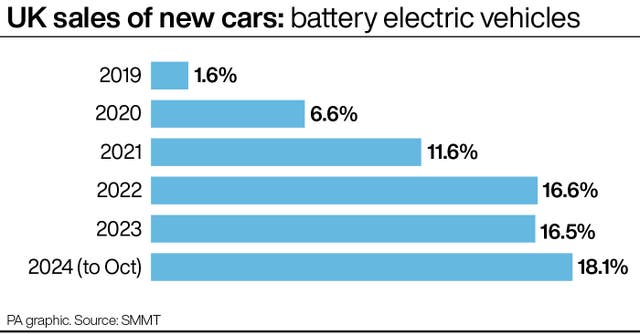The problems facing car manufacturers as they shift to electric vehicles are not confined to Stellantis, Business Secretary Jonathan Reynolds warned after the Vauxhall owner announced plans to close its Luton plant.
Mr Reynolds said ministers did “everything we possibly” could to prevent the closure, which Stellantis said was made within the context of the “stringent” UK zero-emission vehicle (ZEV) mandate.
The Business Secretary confirmed plans to review the ZEV mandate, which sets strict targets for manufacturers to sell electric vehicles, as part of a consultation on the Labour government’s plan to ban the sale of new “purely petrol and diesel” cars by 2030.

Mr Reynolds said the announcement of the Luton closure, which puts 1,100 jobs at risk, was a “dark day”.
But in a warning there could be further problems, beyond the Stellantis announcement and Ford’s plans to shed 800 jobs over three years, Mr Reynolds told MPs: “These challenges are not confined to any one company.
“Car manufacturers around the world are battling with increased costs, supply chain issues and changing consumer demand in a highly competitive, fast-evolving market.”
He added: “Many of the challenges faced by our car manufacturers are global in nature and they cannot be resolved by UK government intervention alone.”
But he said that “decarbonisation must not mean deindustrialisation” and promised to work with the industry on the transition to cleaner cars and vans.
“Winning the race to net zero and having a world-leading automotive sector must go hand in hand,” he said.
The ZEV mandate requires major car manufacturers to have zero-emission – in effect purely electric – vehicles making up 22% of their sales fleet this year, increasing to 28% in 2025 and rising further in subsequent years.
If the manufacturer does not hit the target, it will be fined £15,000 for every vehicle that it sells that does not comply with the mandate.
The targets were laid out under the Conservative administration, which set a deadline of 2035 for phasing out the sale of new petrol and diesel-powered cars.

Labour plans to bring that deadline forward to 2030 although Mr Reynolds’ suggestion it will apply to “purely” fossil fuel-powered cars means hybrids may be able to be sold beyond that date.
Labour’s election manifesto promised a “phase-out date of 2030 for new cars with internal combustion engines”, causing industry anxiety over the future of hybrids, which use electric batteries along with petrol or diesel power.
Mr Reynolds told the Commons: “We will be shortly fast-tracking a consultation on our manifesto commitment to end the sales of new purely petrol and diesel cars by 2030.
“But we will use that consultation to engage with industry on the previous government’s ZEV transition mandate and the flexibilities contained within it.”
Shadow business secretary Andrew Griffith told the Commons: “The closure of the Luton plant, I fear, is just a down payment on jobs that will be lost under this Government’s relentless attacks on industry, its neglect of the realities of business, and its failure to meet its promise not to raise taxes.”
He said it “is the direct result of a Government policy that is simply unworkable for industry”.
Sir Keir Starmer and Tory leader Kemi Badenoch also clashed over the issue at Prime Minister’s questions.
Mrs Badenoch pressed the Prime Minister on whether he would stick to the 2030 deadline if it meant “more jobs will be lost”.
Sir Keir told Mrs Badenoch the ZEV mandates were “actually introduced by the last government” and “she was the business secretary that introduced them”.




Why are you making commenting on The National only available to subscribers?
We know there are thousands of National readers who want to debate, argue and go back and forth in the comments section of our stories. We’ve got the most informed readers in Scotland, asking each other the big questions about the future of our country.
Unfortunately, though, these important debates are being spoiled by a vocal minority of trolls who aren’t really interested in the issues, try to derail the conversations, register under fake names, and post vile abuse.
So that’s why we’ve decided to make the ability to comment only available to our paying subscribers. That way, all the trolls who post abuse on our website will have to pay if they want to join the debate – and risk a permanent ban from the account that they subscribe with.
The conversation will go back to what it should be about – people who care passionately about the issues, but disagree constructively on what we should do about them. Let’s get that debate started!
Callum Baird, Editor of The National
Comments: Our rules
We want our comments to be a lively and valuable part of our community - a place where readers can debate and engage with the most important local issues. The ability to comment on our stories is a privilege, not a right, however, and that privilege may be withdrawn if it is abused or misused.
Please report any comments that break our rules.
Read the rules here